N-BK7 Diffuse Reflectors, Protected Silver Coating

- Highly Diffusive Over Broadband Range from 450 nm to 20 µm
- Polished for Greater Uniformity than Sand Blasting
- Offered in 120, 220, 600, or 1500 Grit Polishes
DG10-120-P01
120 Grit
DG10-220-P01
220 Grit
DG10-600-P01
600 Grit
DG10-1500-P01 Reflecting
Collimated Light from a HNL050LB HeNe Laser

Please Wait
| Diffuser Selection Guide | |||
|---|---|---|---|
| Ground Glass Diffusers | |||
| Standard Diffusers | N-BK7 Substrate | Unmounted, Uncoated | 350 nm - 2.0 μm |
| Unmounted, AR Coated | 350 nm - 700 nm 650 nm - 1050 nm |
||
| Mounted, Uncoated | 350 nm - 2.0 µm | ||
| UVFS Substrate | Unmounted, Uncoated | 185 nm - 2.0 µm | |
| Diffuse Reflectors | N-BK7 Substrate | Unmounted, UV-Enhanced Aluminum Coated | 250 nm - 450 nm |
| Unmounted, Protected Silver Coated | 450 nm - 20 µm | ||
| Unmounted, Protected Gold Coated | 800 nm - 20 µm | ||
| Alignment Disks | |||
| Engineered Diffusers®* | |||
| Glass Diffusers | UVFS Substrate | Unmounted and Mounted, Uncoated | 193 nm to 2.0 µm |
| Polymer Diffusers | ZEONOR Substrate | Unmounted and Mounted, Uncoated | 380 nm to 1.1 µm |
| Diffuser Kits | |||
*Engineered Diffusers® is a registered trademark of VIAVI Solutions, Inc.
Features
- Ø1" Diffuse Reflectors
- Coated Surface has 120, 220, 600, or 1500 Grit
- Protected Silver HR Coating for the 450 nm to 20 µm Range
- Clear Aperture: >90% Diameter
- Near-Gaussian Intensity Pattern at Small Angles of Incidence (AOIs) (See Graph Below)
- N-BK7 Substrate
Thorlabs' Diffuse Reflectors are a solution for applications requiring a diffuse intensity pattern. Our diffuse reflectors are produced from an N-BK7 substrate with a protected silver coating applied to the ground side of the optic and are available in 120, 220, 600, and 1500 grit polishes. Though the overcoat helps to protect silver from tarnishing, high humidity environments should be avoided.
Polished diffusers are advantageous over sand blasted diffusers as the surface has greater uniformity. The various grits provide a range of reflected intensity distributions. A coarser grind (e.g., 120) creates a wider diffusion pattern, while a finer grind (e.g., 1500) will provide a more localized one. The distribution of reflected light (AOI = 0°) for each diffuser is shown in the graph below. To see how the distribution changes for AOIs of 15°, 30°, and 45°, see the Graphs tab. This sample data is typical and results may vary.
These diffuse reflectors have a thickness of 2.0 mm and thus are too thin to be used in our standard mirror mounts. Mounting options include our LMR1 Fixed Mount for Ø1" Optics, Ø1" lens tubes, or the KM100T Threaded Kinematic Mount. When mounting a diffuse reflector in a threaded optic mount, such as the LMR1, the ground and coated surface should face the lip of the mount and the retaining ring should secure the uncoated side, as shown in the image on the bottom right. If the diffuse reflector is mounted facing the opposite direction, the reflective face will be recessed inside the mount and the housing will block a portion of the diffusely reflected light.

Click to Enlarge
Mount the optic with the input face towards the back of the LMR1 to prevent the obstruction of reflected beams.

Click to Enlarge
Click Here for Raw Data
This typical data was taken with a light source at a 0° AOI. The curves are normalized to the peak measured value for the 1500 grit diffuser to highlight the differences in peak shape and intensity distribution between diffusers.
| Common Specifications | |
|---|---|
| Coating on Grit Side | Protected Silver |
| Average Reflectance of Coating (AOI = 0 to 45°) |
>97% (450 nm to 2 µm) >95% (2 µm to 20 µm) |
| Substrate | N-BK7 |
| Diameter | 1" (25.4 mm) |
| Diameter Tolerance | +0.00/-0.25 mm (+0.00"/-0.01") |
| Thickness | 2.0 mm (0.079") |
| Thickness Tolerance | ±0.2 mm (0.008") |
| Clear Aperture | >90% Diameter |
| Parallelism | <3 arcmin |
| Item # | Grit |
|---|---|
| DG10-120-P01 | 120 |
| DG10-220-P01 | 220 |
| DG10-600-P01 | 600 |
| DG10-1500-P01 | 1500 |
Below are the reflectance curves for the protected silver coating for S-polarized, P-polarized, and unpolarized light. The shaded region of the graph denotes the wavelength range over which we recommend using these diffuse reflectors. A link to download the raw data is available below the graph.
For each grit available on this page, we have provided data showing the reflected intensity distribution for four AOIs. Intensity distributions were measured with a collimated source at a 0°, 15°, 30°, or 45° AOI. The gap in each curve represents the AOI of the light source. The intensity measurements were normalized by setting the peak measured value for the 1500 grit diffuser with the source at a 0° AOI equal to 1.
| Posted Comments: | |
Jonathan Cohen
(posted 2024-03-19 07:16:32.93) Would you please tell me the thickness of the Ag coating on the DG10-600-P01 ground glass diffusers. We would like to etch a pattern on the surface and need to know the thickness.
thanks,
jc jdelia
(posted 2024-03-19 01:15:59.0) Thank you for contacting Thorlabs. We unfortunately cannot share this information as our coating thicknesses are proprietary. We apologize for the inconvenience. I have contacted you directly to discuss your application. user
(posted 2024-02-09 10:49:16.46) Is the damage threshold comparable to a similarly coated mirror or better/worse? cdolbashian
(posted 2024-02-16 03:27:38.0) Thank you for reaching out to us with this inquiry. We would expect the damage threshold to be lower, due to the fact that these surfaces are not polished for optimum reflection. There could be localized heating due to surface/sputtering imperfections. I have contacted you directly to address these concerns. Christopher Reilly
(posted 2022-01-05 07:54:45.21) Dear Thorlabs,
Is it your expectation that the angular spread produced by the diffusers should scale (in the small angle limit) in inverse proportion with the wavelength? We are using a 600-grit diffuser for a 3.3um beam and we are not observing the diffusion expected from the graph on the product page.
Best,
Chris cdolbashian
(posted 2022-01-31 05:00:44.0) Thank you for reaching out to us Chris! We would indeed expect that behavior from the diffuse reflector, though we do not have any test data at the moment to support this. I have reached out to you directly for additional information and data. Kevin Cognee
(posted 2021-08-16 17:19:15.413) Can you explain to me why a higher grit value leads to a smaller divergence of the beam after reflection?
A higher grit being equivalent to finer details, the support of the Fourier transform of the field should be wider, and therefore I expect the beam to be more and more divergent with an increased grit.
Thank you,
Kévin Cognée cdolbashian
(posted 2021-08-27 10:15:05.0) Thank you for reaching out to us at Thorlabs. I have reached out to you directly to discuss some of the theory behind these diffusers. We have determined that the angle of divergence of the reflected beam is dependent on both the RMS surface roughness AND the grit size of the diffuser chosen, leading to smaller grit diffusers having smaller divergence angles. We have data to show this in our "Graphs" tab. cbrideau
(posted 2013-04-01 13:20:04.197) I am working on an application where I need good diffuse reflection of 400 to 700nm. I notice the silver coating rolls off at ~450, but could you do this with aluminum or UV-enhanced aluminum? If you could this would be perfect for my application. jlow
(posted 2013-04-01 15:34:00.0) Response from Jeremy at Thorlabs: We could do this with UV-enhanced aluminum. I will get in contact with you regarding the quote for this. |
 Products Home
Products Home










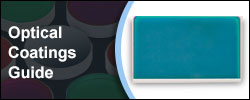

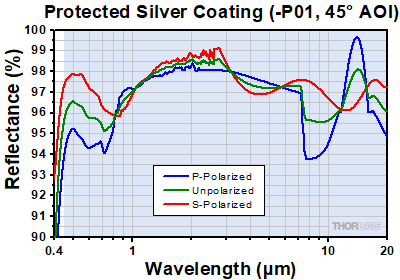

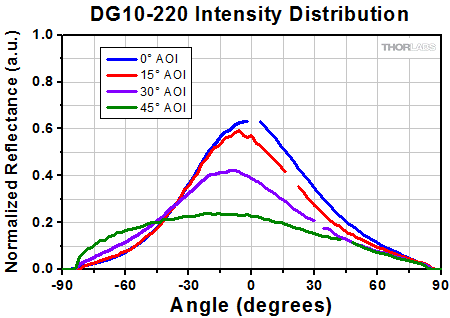
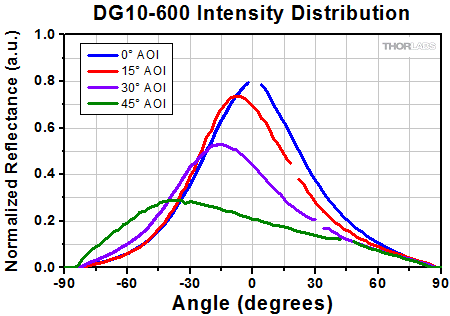
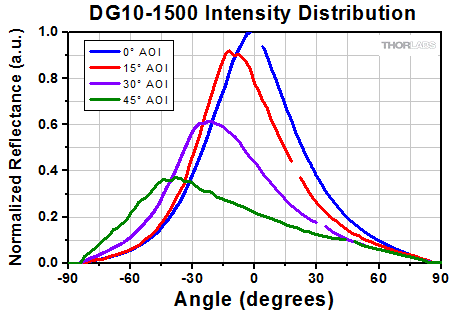
 N-BK7 Diffuse Reflectors, Protected Silver Coating
N-BK7 Diffuse Reflectors, Protected Silver Coating